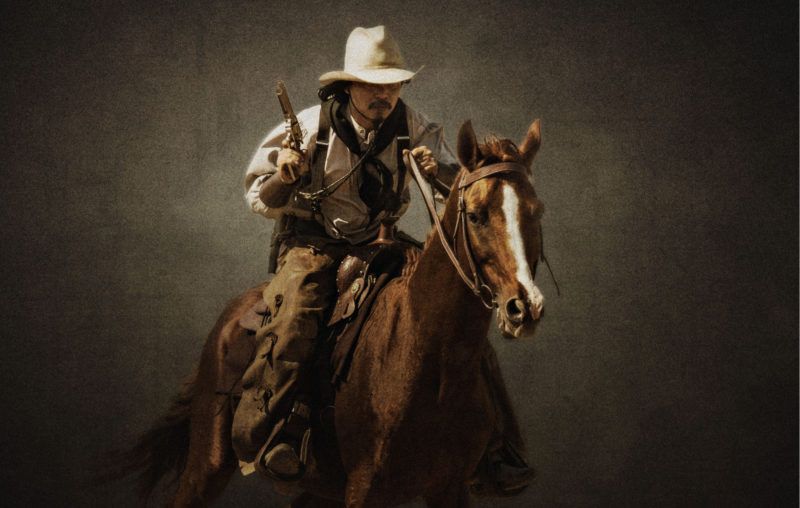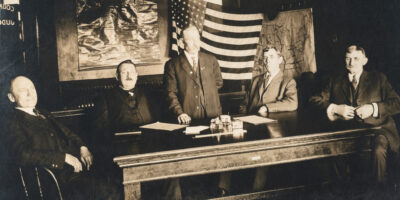American History Reveals the Alternative to the Police State

Americans could reform their police departments in many ways to make them less brutal but some protesters go further and seek to dismantle them entirely. Cynics might see such a move as a ploy to spend taxes on local income redistribution programs while drawing policing resources from state and federal police agencies. After all, nobody is going to finance businesses that cannot obtain adequate insurance coverage due to a dearth of local law and order infrastructure.
Eliminating the police entirely certainly would stop police brutality but many people fear that even more violent alternatives would arise to fill the resulting void. They imagine violent anarchy, mob rule, or rule by the Mob, i.e., organized crime syndicates like the Mafia or Mexican drug cartels. Something like that could result, but with a proper transition we could also end up with a more peaceful, prosperous society without a police presence.
I speak not of some utopian scheme but of history, American history. America’s first police force, in the modern sense, formed in Boston in 1838, over half a century after the Declaration of Independence, but it wasn’t until the 1880s, a century after independence from British tyranny, that all major U.S. cities operated police departments. Businesses eager to lay the cost of protecting their property onto all taxpayers, not public disdain for criminal activity, were the prime movers of the change.
Why wasn’t police-less early America overrun with crime and anarchy? Most commentators cop out, pun intended, with some variation of the “those were simpler times” non-explanation. For starters, those were more complex times. If you don’t believe me, try living a week without running water, electricity, gas heat, or toilet paper. Lack of just the last mentioned item alone sent half the country into a tizzy just a few months ago!
It isn’t that things were “just safer” then, either, as people living on the frontier might have the tops of their skulls removed while watching their wives get raped and their children’s brains get bashed out on trees. Nay, people’s lives were less valuable then and horrific acts of violence that would make the George Floyd video look downright peaceful by comparison occurred.
Interracial violence between American Indians and Euro-American colonists, and enslavers and enslaved, was particularly brutal. But mutually beneficial commerce was the rule in the former case and in the latter violence on both sides was considered the natural result of the state of war existing between them. No violence then, interracial or otherwise, entailed a breach of trust the way police brutality does today.
So how did early Americans prosper without the putative protection of a police state?
For starters, many armed themselves, as was their right under the original understanding of the Second Amendment, various state constitutional clauses, and natural rights doctrine. Each adult understood they had to protect themselves, their loved ones, and their own property. Not everyone armed themselves with gun or blade, especially in urban settings where crowds provided adequate personal defense in daylight in most neighborhoods. Older gentlemen with something to lose, however, often carried ingenious contraptions like cane swords and guns, just in case.
In rural areas, you were lacking if you weren’t packing because you never knew when a desperate predator, of the human or furry variety, might try to steal your stuff or take your life. For those too young to remember, Michael Bellesiles’s claim that early Americans didn’t own many functioning firearms was the original fake news. Turns out that most early Americans were armed, to protect themselves and others when called to do so via militia or posse duty, forms of in-kind taxation that turned every able-bodied man into a temporary riot suppressor or law enforcement official when needed.
Early Americans were not very effective at either role — you get what you pay for, which was nothing — but that was the point. Early Americans were not eager to again see regular troops in the streets or living in their houses and hence remained satisfied with numerous government-run militia units of indifferent quality augmented by a few elite privately-organized and -run units, usually of cavalry or cannon. Occasionally, units established by rival political factions squared off against each other, as they did in Albany on Independence Day in 1788. But the cannon play was half-hearted as nobody had an incentive to destroy their own city.
Laws were easily enforced because there were relatively few of them, and they were widely viewed as legitimate so no thief, rapist, or murderer could escape justice other than by fleeing to the frontier or some seafaring vessel. People prayed for those who fell victim to alcohol or other “intoxicants” and sought to help them via nonprofit organizations. I have a book called Liberty Lost coming out about them so I will move on before I bore you to tears with the details.
Where early America lost its way was by not allowing insurance companies to develop programs to limit theft and property damage. There is a whole big history here, some of which I relate in Financial Exclusion (which AIER published in 2019) and elsewhere. The gist is that until the mid-twentieth century, regulators forced U.S. insurers to provide one, and only one, type of insurance.
As a result, theft insurance received short shrift as most insurers concentrated on insuring goods in transit, along with the ships, wagons, and railroad cars in which goods were shipped, or fire insurance. In both instances, insurers led the way in safety improvements, especially the development of fire resistant buildings and manufacturing protocols, a story well told by Sara E. Wermeil in The Fireproof Building. At the same time, as noted above, businesses that could not find theft insurance turned to police departments instead.
What does all this mean for Minneapolis and other cities considering eliminating their police forces? In short, it can be done safely, if:
- Governments restore individual Second Amendment rights to all citizens, which they should have done after SCOTUS made clear in various decisions that the police do not have to protect individuals or their property. (That’s right liberals, your very own New York Times wrote about it in 2005. For those readers who rightly do not trust that source, here is a more recent overview from Mises.org) A wave of mass shootings will not ensue and in fact gun violence will probably remain about the same, except in domestic disputes, admits the New York Times. South Dakota, which has long had liberal gun laws, last year enacted Constitutional Carry, which means that anybody can carry any weapon anywhere in public, openly or concealed, without a permit. The main opposition to the bill came from law enforcement, which rightly viewed it as a threat to their funding as free people learn the police are unnecessary. Private citizens used their gun rights to protect themselves and their property when out-of-state rioters tried to cause problems in Sioux Falls on 31 May.
- Governments repeal laws against victimless crimes like drug use and prostitution. Repealing such laws would render a large percentage of the police force, and most of its contact with the public, unnecessary. Between 2002 and 2012, the NYPD alone spent 1 million police hours to arrest 440,000 people for marijuana possession. It is difficult to imagine a greater waste of resources.
- Governments allow insurers to enforce traffic laws, another major drain on police department resources. Insurers can do so by insisting on higher premiums for moving infractions, like speeding, which can be enforced via onboard monitoring devices as well as intersection cams owned and operated by a consortium of automobile insurers. (Auto registration and licensing can also be handled by insurers instead of state agencies. Sorry DMV but your long lines and surly employees are a form of needless torture.)
- Governments concede that most private property protection in America is already provided by private security companies working in conjunction with insurers. (Check out this example.) Regulatory barriers to the further development of private security and insurance should be removed to ensure that businesses and homeowners are sufficiently protected from theft and other physical risks to be able to obtain financing.
Basically, insurance works through market forces. Insurers tell insured businesses and homeowners that their premium will go down if they take certain precautions. Insureds can shop around for better terms if they wish. Property insurance is a very competitive industry so insurance is usually available at the lowest actuarially rational rates.
When not over-regulated, insurers often have incentives to provide quasi-public (often shared club) goods like research, safety testing, search and rescue ships, and even roadside assistance, usually through cooperative endeavors. They have, and could again, provide private firefighting services that put out all fires and work out payments later, behind the scenes.
Protection services could be provided in like manner, with perpetrators apprehended and turned directly over to the criminal justice system while insurers worked out the costs among themselves. To the knee-jerk haters of “capitalism” out there, the spectre of private protection forces and large insurers may seem dystopian but consider that consumers “defund” poorly performing companies every day without having to stage mass protests or win drawn out political battles.
They simply shift their dollars from Bad Apple to Good Job. Insurers would have strong incentives, in other words, to prevent security guards from unionizing and of course partial immunity would not protect their bad acts. They would also have strong incentives not to hire guards, or former police officers, with bad reputations. The key would be to keep the property insurance and private security sectors competitive as there is little reason to replace a state monopoly with a private one.
If I had proposed these changes just a few months ago, critics would have labelled such “experiments” as too “dangerous” to attempt. But since mid-March, our governments have conducted much more dangerous experiments in central planning that utterly, and predictably, failed.
There is ample evidence that decriminalization of Americans’ personal lives, the proliferation of gun ownership, and the encouragement of competitive markets for property insurance and private protection services can greatly improve upon our current monopolistic, union-controlled, taxpayer-funded machines of state repression.










